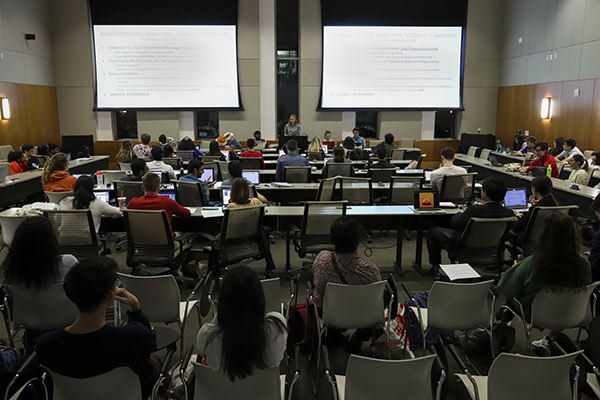UT Senate of College Councils passed legislation related to two of the six initiatives it planned on introducing this semester, according to its 2019-20 agenda.
They passed one resolution in support of expanding the definition of no-contact directives, and another in support of creating a survey for students to provide feedback for Quest, an online learning platform. The four resolutions Senate has not introduced support expanding the philosophy curriculum, creating a virtual counseling service, reducing barriers to orientation for families with less access and creating deadlines for faculty reporting academic dishonesty.
Senate vice president Katie Lee said they are currently working on the other resolutions but will wait until next semester to introduce them.
“We always set ambitious goals, but this was just a strategy to plan the meeting flow of how we were going to orient our policy planning,” said Lee, a Plan II and Arabic flagship junior. “A lot of those (resolutions) are nearing the finishing of creation.”
Senate president Elena Ivanova said the Senate, which meets twice a month, usually does not pass as much during the fall semester.
“The first semester is really having conversations with administrators and setting groundwork,” said Ivanova, a public health, government and Plan II senior. “Once there’s a course of action in place, we take (legislation) to break to work on the items and make them more concise and clear. We end up passing most things (spring) semester.”
Ivanova said three joint resolutions, which go through all three legislative student organizations, have passed this semester. One of these joint resolutions introduced the no-contact directive initiative, which allows the Title IX office to prevent two people from making contact out of concern for student safety. Ivanova said joint resolutions can cause other legislation to take longer to pass.
“We have really shifted the culture of certain Senate legislation, and it’s become a lot more focused on student issues,” Ivanova said. “I’ve loved the collaboration we’ve had with Student Government and Graduate Student Assembly this semester because we’ve had to think about issues that are intersectional and how we can pass meaningful legislation.”
Ivanova also said the first semester serves as a learning period for new members of Senate.
Sameeha Rizvi, a Senate at-large member and public health freshman, was a co-author of a joint resolution asking the University to provide more free menstrual products. Rizvi said this helped her learn how to write legislation faster than others.
“You have to write legislation in the most efficient and well-worded way possible,” Rizvi said. “You have to be well-educated on the subject you’re writing about, and it’s hard. There is a lot of bureaucracy around it. I was shocked I was able to do this as a freshman, but I found something I was really passionate about.”
Ivanova said the executive board tried to empower students to lead their own initiatives this semester, and she looks forward to the next semester.
“I feel inspired,” Ivanova said. “I am a little tired, but this has been objectively the semester with the biggest growth. We really took the time to invest into our members as leaders instead of just doing it ourselves. Everyone is so passionate, and they have their own ideas, and they are ready to work.”





















